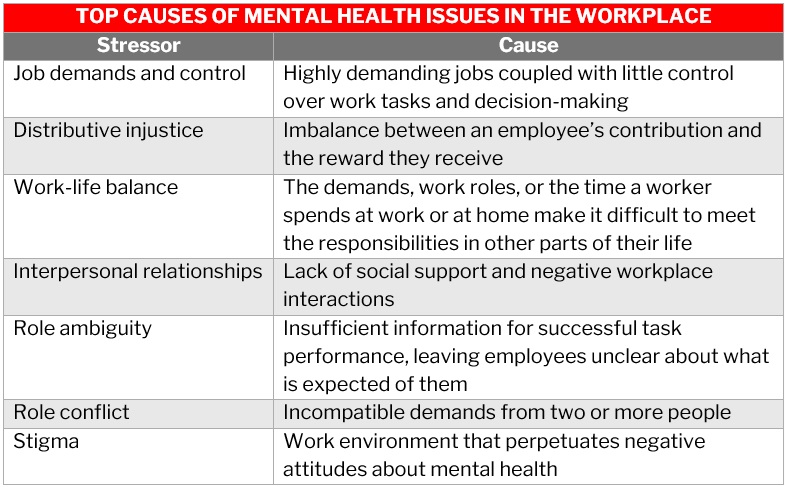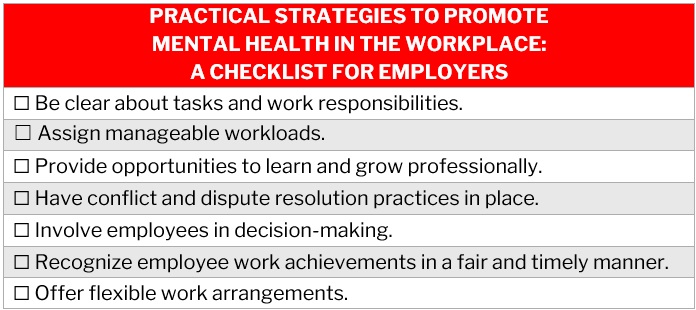Employee mental health programs play a vital role in promoting a positive work culture. Find out what national programs are available for your business

Workplaces are key to maintaining positive mental health. They can give employees the opportunity to feel productive and thrive in their careers. But they can also be stressful environments where workers face tremendous pressure, adversely affecting their overall well-being.
No workplace is immune from mental health challenges. That’s why it’s important that employers ensure that workers can readily access the support they need.
If you’re searching for ways to build a healthy and supportive work culture, this guide can help. In this article, Benefits and Pensions Monitor lists the different employee mental health programs in Canada. We will provide an overview of each, including how these programs can guide employees in overcoming work-related psychological and emotional challenges.
Find out how these initiatives can transform your work environment and enhance employee satisfaction and productivity.
How do employee mental health programs work?
Employee mental health programs are workplace initiatives designed to help staff manage mental health challenges such as stress, depression, and anxiety. These programs can be customized to meet the specific needs of the workforce. Among the services employees can access are counselling, therapy sessions, mental health workshops, and resources for stress management.
A good mental health program, however, goes beyond just offering support. It must also create a work environment where employees feel safe seeking help without fear of being judged by others.
The process of creating a sound workplace mental health program often starts with recognizing the psychological and emotional needs of employees. Initially, employers may conduct surveys, assessments, or consultations to identify the areas where workers need the most support. Based on their findings, companies then develop a holistic program that includes preventative and reactive measures to support staff going through difficult times.
Employee mental health programs in Canada provide different types of services. The most common are:
- Employee assistance programs (EAPs): The most widely implemented programs, EAPs give employees access to confidential counselling services for both personal and work-related issues. These programs cover a range of areas, including stress management, relationship challenges, and substance abuse.
- Stress management workshops: These initiatives provide staff with tools and strategies to help them manage stress and maintain a healthy work-life balance.
- Peer support programs: Peer support systems create an internal network of mental health advocates within the company. In these initiatives, selected employees are trained to offer support and guidance to their colleagues dealing with personal struggles. Peer supporters often experienced mental health issues themselves, allowing them to draw on lived experience to help others.
- Managerial training programs: These programs focus on training supervisors and managers on how to spot early signs of mental health challenges in their teams and respond appropriately.
- Therapy and counselling services: Some employers offer staff free or subsidized therapy sessions with licensed professionals.
Get practical tips and strategies on how companies can promote mental health in the workplace in this guide.
What are the different employee mental health programs in Canada?
Apart from self-developed initiatives, Canadian employers can also access a range of external mental health programs for their employees. These programs are often designed by industry bodies and government agencies to provide different kinds of support for workers dealing with mental health struggles.
Here are the top workplace mental health programs from some of Canada’s largest mental health associations:
Canadian Mental Health Association (CMHA)
CMHA is one of Canada’s largest mental health organizations. It boasts presence across 11 provinces and territories. The association serves 330 communities through the help of 7,000 employees and 11,000 members and volunteers. It offers several national mental health programs targeted at the workforce. These include:
Not Myself Today
Not Myself Today is a social enterprise created to help reduce stigma and support mental health at work. The subscription-based program gives employers access to a range of tools and resources to help them:
- build greater awareness about mental health
- reduce stigma about mental illness
- foster a safe and supportive work culture
At present, more than 1,000 organizations from across the country have taken part in the program. These include Capital One, Cenovus Energy, the Edmonton Elks, and the University of British Columbia.
Workplace mental health training
Under this initiative, companies work with CMHA workplace mental health specialists to develop a mental health training program customized to the unique needs of their business.
The training sessions are interactive and focused on finding solutions to common mental health issues in the workplace. Some topics the program covers include:
- burnout, stress, and anxiety
- general mental health awareness and skill-building for employees
- building resilience and managing stress
- self-care and work-life balance
- leadership and management training
- neurodiversity in the workplace
- remote working, returning to work, and coping with change
Psychological health and safety training
CMHA offers two courses for individuals who want to specialize in psychological health and safety (PHS) in the workplace:
- Psychological Health & Safety: The Essentials: This is an introductory course on PHS and the core elements of the National Standard of Canada for Psychological Health & Safety in the Workplace.
- Psychological Health & Safety Professional Certificate: This course offers in-depth training on PHS for those who are developing a PHS management system that complies with the National Standard.
Peer Support Canada
Peer Support Canada (PSC) aims to increase the recognition, growth, and accessibility of peer support in Canada. It exists currently as a program of the CMHA but is working towards establishing itself as an independent organization.
In 2013, PSC established a framework for the Standards of Practice, Core Values, and Principles to guide peer support workers and peer support programming in Canada. PSC services are accessible to all Canadians, not just employees.
Learn more about the benefits of peer support workers in the workplace in this guide.
Resilient Minds
Resilient Minds is a trauma-informed and peer-led mental health awareness training program for first responders in Canada. The program was designed by industry insiders and provides training on a range of topics, including:
- recognizing the impact of psychological stress or trauma in self and peers
- understanding trauma-informed practices
- communicating with peers who may be struggling
- responding safely and appropriately to distressed citizens
- applying personal strategies for managing stress, mitigating trauma, and boosting resilience
Health Canada
Health Canada’s employee assistance program (EAP) is accessible to employees in more than 90 federal organizations and their families. The program boasts a network of mental health professionals that represent a diverse public service sector. It offers counselling and quality assurance services through various EAP providers. The program is accessible 24/7.
Mental Health Commission Canada (MHCC)
MHCC is a non-profit organization committed to helping employers promote mental health in the workplace by providing tools, information, and programs. The organization also offers tools and resources to enable businesses to implement employee mental health programs that align with the National Standard of Canada for Psychological Health and Safety in the Workplace. These include an online toolkit, customizable posters, and the MindsMatter tool, which was developed in collaboration with individuals with first-hand experience of mental health issues.
Apart from this, MHCC offers several employee mental health training programs, including:
Mental Health First Aid Canada
This training program imparts the skills that managers and employees need to identify early signs of distress in colleagues and provide immediate assistance until professional help is available.
The Working Mind
This program is designed to promote mental health and reduce the stigma of mental illness in the workplace. It is also intended to foster resiliency among managers and employees.
MHCC offers a similar program tailored for first responders, aptly called The Working Minds First Responders.
Being a Mindful Employee
This free online training program helps employees understand the 13 factors from the National Standard of Canada for Psychological Health and Safety in the Workplace. It consists of four modules:
- Managing you: This module focuses on how employees can maintain balance and support their own growth and development in the workplace.
- Interacting with others: This covers inclusion, support, and psychological protection at work.
- Dealing with work stressors: This discusses clarity, competencies, workload, and influence in the workplace.
- Contributing to a positive culture: This module focuses on civility, respect, pride at work, and supporting others.
This course is delivered in partnership with the Canadian Centre for Occupational Health and Safety (CCOHS).
What are the most common workplace mental health issues?
At least 500,000 Canadian employees miss work due to mental illness each week, according to the latest data gathered by the Canadian Psychological Association (CPA). This figure translates to around $51 billion in economic losses every year. It also shows how mental health issues have become a major concern in the workplace.
Here’s a list of the most common mental health problems employees face:
- Stress: Workplace stress is often caused by heavy workloads, tight deadlines, and work-life imbalance. If left unchecked, stress can lead to burnout and negatively impact an employee's physical health.
- Anxiety disorder: Whether it’s the pressure to perform, fear of losing their jobs, or uncertainty in the workplace, many employees are struggling due to anxiety. This can manifest in various forms, including difficulties concentrating, increased absenteeism, and reduced job performance.
- Depression: Depression can be triggered by workplace isolation, lack of fulfillment, or overwhelming workloads. It’s a serious mental health condition that can result in decreased engagement and increased turnover.
- Burnout: With the rise of remote work and the constant demand to be available, burnout is becoming more prevalent. Burnout occurs when employees feel emotionally exhausted, disconnected, and less effective at work, leading to long-term disengagement.
- Substance abuse: Some employees may turn to alcohol or drugs to cope with work-related mental health issues. Substance abuse can severely affect job performance, and lead to absenteeism, decreased productivity, and strained workplace relationships.
The table below lists the top contributors to work-related mental health issues, according to CPA’s data.

What are the benefits of employee mental health programs?
The Public Health Agency of Canada (PHAC) lists several advantages of implementing sound employee mental health programs. For employers and their staff, promoting mental health in the workplace can lead to:
- increased productivity
- positive mood among workers
- employee engagement satisfaction
- reduced turnover
- improved collaboration
Mental health programs in the workplace also makes economic sense as these can:
- prevent short- or long-term medical leaves due to physical or mental illness
- reduce the need to replace staff
- help avoid workplace injuries and accidents due to stress and other mental concerns
- decreased absenteeism caused by stress, exhaustion, depression, and anxiety
- reduce the inability of employees to successfully complete work
PHAC also provides a checklist of how employees can promote mental health and well-being in the workplace. You can download the list for easy reference.

How can you create a holistic mental health strategy for your company?
Check out our group benefits directory if you’re looking for specialists in health and wellness. Many of these companies offer holistic employee wellness programs, which include collaborating with mental health workers.
By working with these companies and the mental health workers they partner with, your employees are guaranteed to receive the best counselling and care.
What employee mental health programs are you proud to have implemented? Let us know in the comments.






